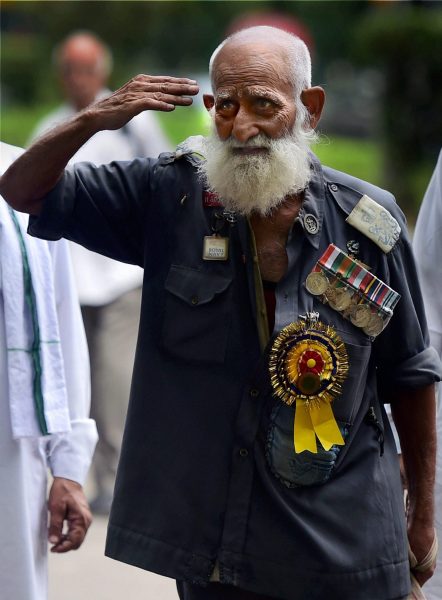This appeared in The Wire website on Aug 25, 2015
Did you or did you not make a promise to implement One Rank, One Pension?

The time for debate is over. It is no longer about the pros or cons of taking a decision. It is now about fulfilling a commitment made by the Prime Minister of India, a commitment made to people who live and die over their commitment to the nation. When Prime Minister Narendra Modi first made the announcement of One Rank One Pension (OROP) at Rewari in 2013, it was without any ifs and buts. That promise won the military community over and they voted for him in overwhelming numbers. I know this from my first-hand experience in Chandigarh when I contested the Lok Sabha elections last May.
Not to digress but 16 months since later, the veterans are still waiting. After some hollow words and promises from Union ministers and BJP spokespersons, what we have now from the ruling party and the Prime Minister is silence, a thundering silence. Veterans, proudly wearing their medals on their chest, are protesting not very far from our Republic’s seat of power. The hunger strike at Jantar Mantar is now in its tenth day. No senior minister has had the courtesy to pay a visit and see what they are going through. It is a painful and heartbreaking sight for anyone but it hurts even more when three generations of your family have served and are serving in the Indian Army.
The OROP issue has now damaged the political credibility of the current regime—damage that is disproportionate to the number of people it actually affects. Because from being an issue that directly affects a handful of Indians (relatively speaking), it has now caught the imagination of the entire country.
One Rank, One Pension affects only those who have already retired from the defence services and those who will retire in the future — and their families. For the sake of convenience, let’s put a number on it. The entire veterans community and their families would tally up to no more than a crore. That’s less than one percent of the Indian population. Why then, has this issue occupied political centre stage today?
Was it the rough handling of the veterans? Or the complete and deafening silence from the executive? Or images of veterans, well into their 80s, peacefully protesting against the delay in implementation of what they were led to believe is their right? Why has the OROP issue united, albeit emotionally, the entire nation? And why has it brought out our collective patriotism from cold storage?
The answers to these questions lie in the difference between our soldiers and the political leadership.
Our soldiers fight for naam, namak and nishaan and do so while blindly trusting their civilian masters—the elected leadership of the country. The veterans – and even serving soldiers – now feel that these civilians masters have taken them for a ride, led by the tallest political leader in the country. The contrast between the two – the soldier and the politician – couldn’t be starker. And it has struck a chord with every single Indian.
We are now being told that the OROP is not affordable. I can easily get into “what about the Sardar Patel statue” or “the new fleet of VVIP aircraft” but that would be to digress from a point that is really simple. Did you or did you not make that promise, Mr Prime Minister? I, for one, find it hard to believe that someone who had been a chief minister for 12 years made the promise unthinkingly, without knowing what he was saying. The time to discuss, debate and have a public dialogue on OROP — or its merits and demerits — has long gone. Reams have been written on it and I would not like to add to the arguments which are already in the public domain.
Let us not forget that OROP is perhaps the only issue where consensus exists across the political spectrum: every single party is committed to it. And it doesn’t even need a constitutional amendment like the GST; or an ordinance as was done for the Prime Minister’s principal secretary, or for the Land Bill. It is a simple executive decision, a signature on the file where all the details and implementation schedule have been worked out, which will uphold the Prime Minister’s word.
Do it quickly, do it well, do it in full. After all, as they say in the military, Mr Prime Minister, it is a matter of honour. Your honour.
Gul Panag is an actor and an entrepreneur
